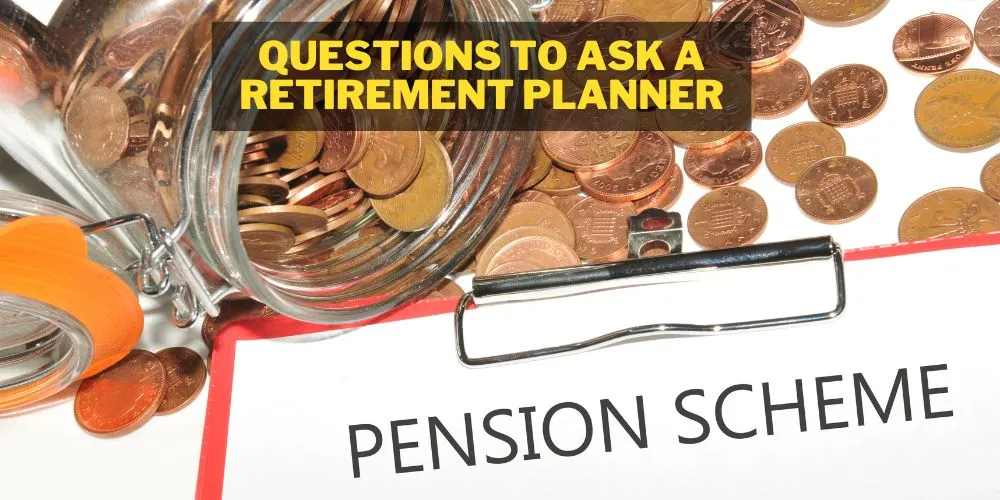Finding the right retirement planner is key to ensuring a secure and comfortable future. It’s a process that calls for asking the right questions to find a professional who not only understands your goals but can also guide you towards achieving them. This article provides a detailed guide on questions to ask a retirement planner to make an informed decision.
Understanding Qualifications and Experience
Credentials and Qualifications
When you first meet a retirement planner, it’s crucial to understand their professional background. Ask about their certifications or designations. Certifications like CFP (Certified Financial Planner) or RIA (Registered Investment Advisor) indicate a recognized level of expertise and ethical standards.

It’s also relevant to inquire about their commitment to ongoing education. This shows they keep up with the latest in financial planning.
Experience
Experience in retirement planning matters. Ask how long they have worked in this field. It will give you a sense of their track record and depth of knowledge.
Requesting references or testimonials is also wise. It provides insights into their reliability and the satisfaction of their clients.
Services Offered
Scope of Services
Understanding what services a retirement planner offers is essential. Do they provide comprehensive planning, including estate planning, tax advice, or insurance solutions?
Knowing this will help you gauge whether their services align with your needs.
Investment Strategies
The investment strategies recommended by your planner should match your risk tolerance and financial goals. Discuss how they tailor their advice to fit different profiles.
Also, it is beneficial to understand their perspective on diversification and risk management. These factors significantly impact your investment outcomes.
Questions To Ask A Retirement Planner
Assessing Client Needs
A good retirement planner will take time to understand your financial situation and goals. Ask how they gather this information and incorporate it into their planning.
Find out what tools or software they use. These resources aid in creating a precise and effective retirement strategy.
Adaptability
Your financial situation and the economic environment will change over time. It’s important to know how often the planner reviews and adjusts retirement plans.
Also, inquire about their strategy for handling market volatility or economic downturns. This discussion will reveal how proactive they are in protecting and growing your investments.
Fee Structure and Transparency
Understanding Fees
Fees can vary widely among retirement planners. Some work on a flat fee, some on a commission basis, and others might be fee-only.
Ask for a clear explanation of their fee structure. Also, inquire about any additional costs that could arise. Understanding this aspect upfront ensures there are no surprises down the line.

Conflict of Interest
It’s crucial to establish that the planner’s recommendations are made in your best interest. Ask if they are a fiduciary, which means they are obligated to prioritize your financial well-being. This guarantees transparency and helps build trust.
Client Communication and Support
Communication Frequency
Knowing how often you’ll communicate with your planner is key. Discuss the frequency of updates and meetings. Confirm the methods of communication they prefer, such as emails, phone calls, or in-person discussions.
Support and Accessibility
Ask about their response time for inquiries. It’s also wise to know who will handle your account if your primary contact is unavailable. This ensures you always receive timely support and advice.
Pro Tips
Before your meeting, think about your financial goals. During discussions, don’t hesitate to ask for clarifications. A follow-up meeting could be beneficial to address further questions.
Frequently Asked Questions
What should I bring to my first meeting with a retirement planner?
Bring any documents that give an overview of your financial situation. This includes income details, investments, liabilities, and an idea of your financial goals.
How does a retirement planner differ from a financial advisor?
A retirement planner focuses specifically on planning for retirement, while a financial advisor may offer broader services that include retirement planning among others.
Can I change my retirement plan if my financial situation changes?
Yes, a good retirement plan is flexible and can adjust to changes in your financial situation. Discuss with your planner how these adjustments can be made.
How does a retirement planner manage taxes on investments?
A retirement planner can help structure your investments in a way that is tax-efficient. This involves strategies to minimize tax liabilities and maximize after-tax returns.
What is the best age to start retirement planning?
It’s wise to start as early as possible. Even if you’re starting in your 20s or 30s, early planning can significantly impact your retirement savings and investment growth.
Remember, a successful retirement plan starts with asking the right questions. Equip yourself with the necessary knowledge to select a retirement planner who can best serve your needs and secure your financial future.
Conclusion
Choosing a retirement planner is a significant decision. The right person will understand your financial goals and guide you towards achieving them.
By asking these detailed questions, you gain a comprehensive understanding of what to expect from a retirement planner.
Feel comfortable and confident in the process, and ensure all discussions are in line with achieving a secure retirement.


 Tags:
Tags:










